The Godrej Industries Group’s annual conference for senior leaders is a big deal for everyone involved - including its caterers. Over two days in early 2024, caterers created menus that tickled every kind of taste and palate, going from high-concept millet salads to fresh-rolled sushi and at least one meal where everything was made from mangoes. Yet the hit of the event was a stall set up by a local Mumbai food company, whose employees came out to Vikhroli to serve their signature chaat and snacks to scores of senior leaders.
Café Arpan and the kitchen that supplies their bakes are the calling card of Yash Charitable Trust, which works exclusively with adults with intellectual or developmental disabilities (IDDs). Café Arpan is among the best-known restaurants in urban India to be staffed consciously by workers with disabilities. It is both a beacon of hope, and a lesson in how to turn a stigmatised, deliberately obscured condition into a solution.
The chaat, as you can imagine, is excellent.
In 2013, psychologist Sushama Nagarkar, the mother of an adult child with autism, was living in the United States of America. There, the type of services a child with a disability can access once they exit the school system and come to be considered adults varies widely by state. Nagarkar hoped to enhance her child’s quality of life, but found it tricky.
“Working in the school system, I saw up close how difficult it was for children and young people to achieve an optimum quality of life after leaving school,” she remembers. Confronting the challenge helped make her goal clear: the focus of her efforts would be the quality of life for young people with IDDs once they left school. “I realised that the number of people and organisations in India working in this space were few and far between. I was an administrator in the US school system; and as a single parent I had long hours of work and my daughter was largely left to her own devices, which didn’t create an optimum quality of life for her. Setting up something like this for her as well as for others like her, and addressing my fatigue towards trying to be there at all times for her, drove me to move back to India,” she says.
In 2014, Yash Charitable Trust (YCT) was born. This is the story of how they succeeded.
The Solution To A Problem
Intellectual disabilities are characterised by significant limitations both in intellectual functioning (reasoning, learning, problem solving) and in behaviours, including everyday social and practical skills. ‘Developmental disability,’ the umbrella term, describes the effect of a delay in sensory, cognitive, social, emotional or communication development. According to a 2023 report by Dasra, up to 3% of India’s 1.3 billion population lives with some form of IDD, and over 12% of Indian children aged 2 to 9 years have neuro-developmental disorders.
The policy environment for persons with IDDs has improved over the last decade. India’s Rights of Persons with Disabilities (RPwD) Act, 2016, legally provides 1% reservation for persons with intellectual disabilities in government jobs in addition to the 1995 Act’s provisions, which were largely for the physically disabled. It recognizes 21 categories of disabilities, as compared to the seven previously identified under law. The Sustainable Development Goals, adopted by all members of the United Nations, recognise the social model of disability, proposing that we cease to look at disability as a medical problem alone, and make efforts to improve the supporting environment and community to uphold the rights of persons with disabilities.
In India, organisations like the path-breaking Mann Foundation and Pune’s Prayatna Foundation have taken the lead in providing functional education, training, and crafting opportunities for persons with IDDs. The Forum For Autism, a public trust, raises awareness about autism and offers a valuable support network not only for individuals with autism, but for caregivers. Like them, Yash Charitable Trust is an institution where the ideals of progressive legislation become reality. After Nagarkar moved to India, she saw her empty garage as a space of possibilities where she could train people with IDDs with skills that they could use in their daily lives and translate to employment. She started with a dabba service operating out of a garage. A team of five people did the gamut of tasks—shopping, preparation, cooking, packaging, delivering the dabbas, and cleaning up.
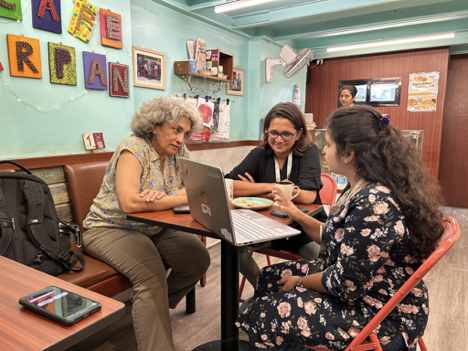
From left to right: Sushama Nagarkar, Ketki Sanghavi, Ketkee Borkar working together at the lively Cafe Arpan.
“It’s a hidden talent pool,” Ketki Sanghavi, hiring coordinator and manager of Arpan’s Adult Support Kendra, says. “While people like you and me – neurotypicals – get bored of predictable routines, people with IDDs seek this predictable lifestyle.” From the dabba experience, Nagarkar inferred that food and beverage services offered a good space for people with IDD to learn the ropes of employment, much like neurotypical adults would at their own entry-level jobs. It took the scope of employment for people with IDD beyond small-scale tasks in candle-, soap- or envelope-making.
How To Be An Employee
Supportive and healthy ecosystems are crucial for providing meaningful employment opportunities; they enable all of us to engage in the real world rather than just working for a paycheck. Arpan’s Skill Development Centre, started in 2019, is the entry point to the YCT programs. It provides training for the hard skills required in F&B, as well as employment readiness skills like punctuality, grooming, teamwork, completing tasks within a set timeframe, following instructions, and asking for help when needed.
Here, participants practise life skills such as travelling alone from home to SDC, cooking rice for themselves, and learning how to cross the road. These powerful acts of self-reliance go a long way in soothing the anxieties of parents and caregivers to people with IDD – and creating a community for neurodivergent persons themselves. Jyoti Patel, the Training Lead at YCT, noted that individuals who joined SDC weren’t even necessarily seeking a job; they revelled in the social circle of like-minded individuals they gained.
The SDC runs two training programmes – F&B and baking. Eventually, the uptake for baking training was so big that they found a bigger space to incorporate more people and train them. It isn’t just about a great slice of cake, though that’s always welcome: baking is a choice that helps people who might want to set up micro-enterprises.
There are other effects. Some individuals in the F&B programme proved less interested in that work than in housekeeping services. So the centre developed a curriculum to nurture that. Over the years, their trial-and-error methods enabled individuals and their families to discover what was best for them, instead of trying to fit into existing expectations and systems.
“You aren’t given any agency for the most part when you have IDD and suddenly at YCT, trainers start asking you about your opinions on what’s going on around you,” Mehndi, who does fundraising and process quality improvement at YCT, told me. “That can cause such a big change within you.” Her brother, also a beneficiary at YCT, went from spending 2 hours at the training centre to spending an entire day there taking a keen interest in interacting with people, as well as picking up skills in the F&B department.
The Café Chronicles
Even an especially rainy day at Café Arpan in Juhu, Mumbai, didn’t deter their regulars. I spotted a group enjoying their sandwiches, and someone mainlining coffee, already deep in work. I was there to meet Ketki Sanghavi, who connected me to the staff and eased them into conversations with me.
Aaron, the chef at Arpan, spoke about his love for making sandwiches, wraps, pasta and salads; and Miloni giggled as she talked about her penchant for beverages which she makes alongside pizzas and pasta. These skills were taught at their SDC training, and reinforced during on-the-job training. Aarti, who greets people at the entrance, tells me she is the team’s ‘music guru,’ and loves opera music and singing. Darren cleans and helps with food prep at the café, and was incredibly eager to get to know the work I do. He spends his time after work studying for the NIOS exams along with Karan from the kitchen.
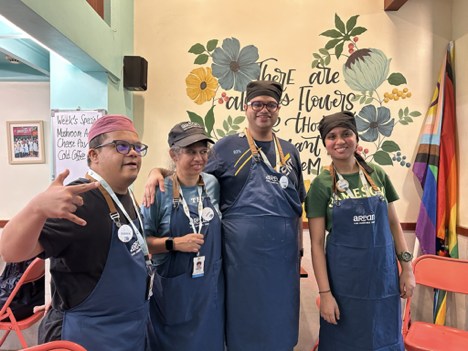
From left and right: Staff members Darren, Aarti, Aaron and Miloni at Café Arpan.
This kitchen, located in a tree-lined gully close to the café, is where meals for the dabba services are made and packed. The staff is extremely strict about hygiene, and all stoves are electric to ensure the safety of employees with IDD. Pratibha, Karan and Rohit spoke to me about meals they like to cook and how the fixed menu for each day guides them to work with ease. What emerged was a picture of many unique approaches to kitchen work, bound by a commitment to the process, and by their warm camaraderie.
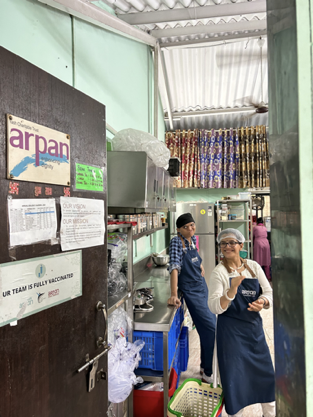
Rohit watches as Pratibha regales the rest of the kitchen team.
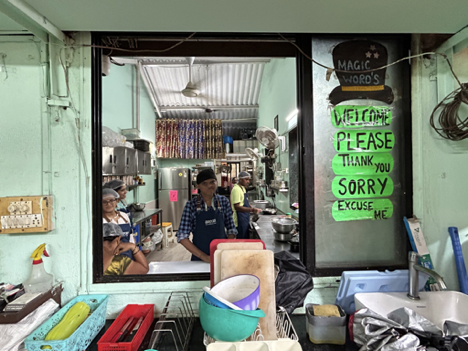
In the frame: Pratibha, Rohit and Karan.
Also close by is their luminous bakery. Within its blue walls, the waft of cinnamon, blueberry compote and fresh bread lifts my mood. Bouncy, fresh loaves of bread, almond biscotti, and experiments in focaccia are Sushil’s forte: he’s a trainer across YCT’s outlets. I sneaked a taste of the freshly made masala puris (chunky, deep fried discs flavoured with fenugreek or cumin) and my favourite little marvel—the softest, meltiest blueberry biscuit, which is a tough cookie to bake.
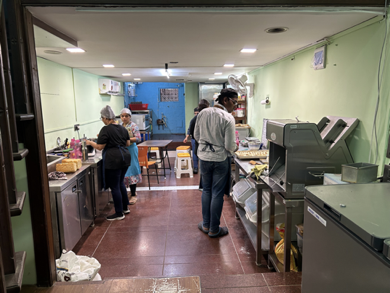
A rainy day at the bakery.
Andrea, an employee at the bakery for a year, pauses her end-of-the-day cleaning to tell me about how she took an active interest in baking—something she couldn’t imagine doing before her training at SDC. Shefali, a YCT intern who has learned to bake, and no longer needs a recipe to guide her, bakes multiple kinds of breads independently. The last Friday of each month is her favourite day: it’s when they bake custom birthday cakes for all employees celebrating that month. She loves to sing, dance and paint and enjoys spending time with her co-workers in the common spaces YCT has designed for them to socialise and host their gatherings.
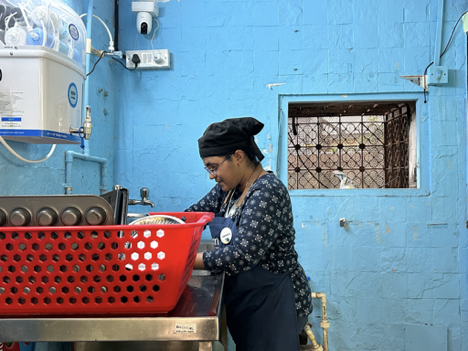
Andrea doing the dishes with a hint of a smile while the author captured her working.
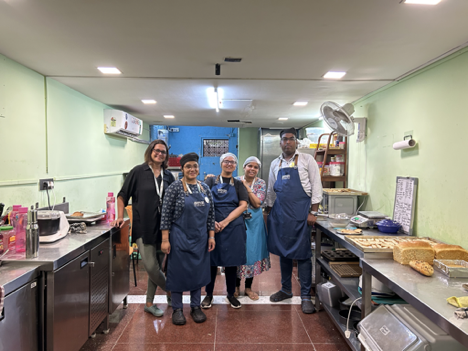
Left to right: Ketki, Andrea, Shefali, Alka, and Sushil at the bakery.
Life Outside YCT
Employment support services at YCT plays a significant role in helping interested PwIDD find job opportunities outside the organisation, too. Ketki shared instances with me where work is customised for each individual. Take for example for a 28-year-old with an intellectual disability with the capacity and preference for sedentary rather than physical work: YCT helped him to find employment in a factory close to his home where he works daily eight-hour shifts placing refills inside pens. A young woman skilled at identifying and sorting through colours and fabrics acquired a job at a boutique, while another individual interested in computers, accounting software, and data entry is placed at a company that could use this skill set. Since this individual doesn’t like to be still for long periods of time, his daily schedule includes tasks that require him, for example, to go to the bank once a day.
Srideep, who spoke to me on the phone, has been placed at SoHo House since June 2022 where he is their unofficial avocado toast and cheese chilli toast expert. His day starts by picking up the vegetable supply for the pantry and he also helps with chopping and food prep. It’s a busy job, but it also means cherished weekends spent drawing and playing with his 5-year old daughter.
YCT now has 24 employees and interns, and has provided jobs externally to 34 people with IDD since 2022 since ESS started. As hiring coordinator, Sanghavi leads the considerable project of listing companies with vacancies and ensuring that people with IDD find jobs that match their skills well. She is a bridge between these individuals and the hiring company, and it is part of her job to ensure that their experience is satisfactory, and communication is clear on every side. It helps YCT to create awareness, and introduces external employers and companies to the realities of living with intellectual disabilities, orienting them through the process of hiring IDD talent – all while championing the cause of people with IDD.
More than 25 people have leveraged services of the YCT—from 2014 to 2019 when there was no distinction between interns, trainees and employees. As of 2024, 59 people have trained at the SDC, out of which 23 have leveraged the ESS and gained employment establishments like The Lalit, Soho House, JP Morgan, and Smoke House Deli.
Person-Centred Planning
In my conversations with YCT, I learned of an approach that helps trainers gain a deep, individualised understanding of the strengths, preferences, and needs of every person with IDD they work with, which guides the development of their personal and professional paths. Here’s how they broke down the approach for me.
The Discovery Phase: This initial stage involves home visits to observe people with IDDs in their most relaxed environments. Understanding their daily routines, interactions with family, and behaviours in familiar settings provides critical insights into people’s capabilities and comfort zones.
Personal Interactions: Following home visits, YCT staff meet with individuals in new settings, such as a café, to observe how they respond to unfamiliar environments. This helps assess adaptability and identify any potential challenges they might face in the workplace.
A Strength-Based Approach: The final step is to complete the mapping of the individual’s interests and strengths, ensuring that the chosen employment path aligns with their capabilities. Depending on their skills and interests, persons with IDD find employment within the ecosystem of YCT’s cafés and bakery, or with an external employer. This approach often reveals hidden talents and corrects misconceptions held by families regarding an individual’s abilities.
Sanghavi told me about one young man with an IDD who came to the centre with his parents-they claimed that their son was unable to read. But during a personal interaction with Sanghavi, this young man demonstrated his ability to read a menu, showing that he could understand both simple and complex words with some help. This multi-faceted approach may be time-consuming, but ensures that no stone is left unturned in understanding individuals with IDD.
Customised Employment Plans: Based on discoveries made in previous phases, YCT develops personalised employment plans that match the individual’s skills and interests with suitable job roles. This ensures that people with IDD are placed in environments where they can thrive and contribute effectively.
“One of the team members, Dheeraj, has made incredible progress,” Ketkee Borkar, F&B manager at Arpan Food Services, tells me. “He has taken on the responsibility of operating our dabba services. Dheeraj now independently takes customer orders, enters them into Excel, and manages our Point of Sale system, Petpooja.” In my conversation with Dheeraj at Café Arpan, I learned that he also delivers dabbas. Given the nature of his work, he splits work between café and home. Ketki gives credit to on-the-job trainer Brinal, who worked closely with Dheeraj to ensure he could handle these tasks with confidence and precision.
At its core, YCT’s work underscores a fundamental truth: we are more similar than different. Humans crave community, interaction, and fulfilment through work—and good work environments and good societies have a lot in common. Both help people thrive and contribute to common well-being.
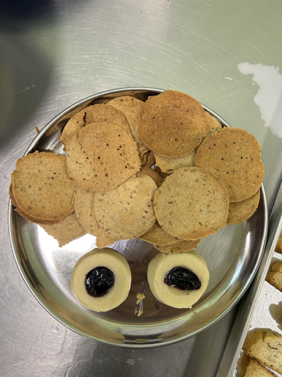
Fresh out the oven: jeera puri and blueberry biscuit.
Text and images by Ritu Desai.
It’s a hidden talent pool. While people like you and me – neurotypicals – get bored of predictable routines, people with IDDs seek this predictable lifestyle.
- Ketki Sanghavi, Hiring Coordinator and Manager of Arpan’s Adult Support Kendra